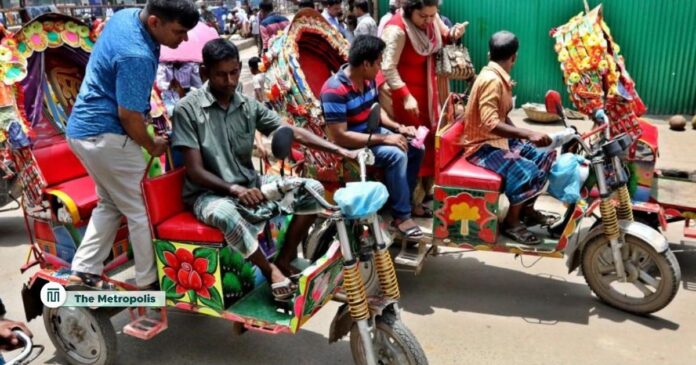The High Court has seven days to reevaluate its position on the use of battery-powered rickshaws in the Dhaka metropolitan area and to resolve the matter through licenses and route permits, according to the Rickshaw, Battery Rickshaw-Van, and Easybike Drivers Sangram Parishad.
In support of the drivers in Dhaka, the group threatened to stage rallies in districts throughout the nation on November 30 if a solution could not be reached.
The group’s Dhaka metropolitan unit convenor Khalequzzaman Lipon announced the ultimatum and the programs that would follow at a rally on Saturday in front of the Jatiya Press Club.
“A Supreme Court decision prohibiting battery-operated autorickshaws from using highways is still in force,” he stated. Therefore, how is it possible for the High Court to rule against rickshaws that run on batteries? The Supreme Court has already declared the High Court’s decision invalid.
In April 2022, the Appellate Division made a ruling prohibiting the use of battery-powered three-wheelers on public roads. Therefore, all other roads allowed the cars to travel.
However, the High Court on Tuesday ordered a three-day ban on cars entering the Dhaka metropolitan area.
The Pedal-run Rickshaw Association filed a writ petition, which served as the basis for the ruling by the bench of Justices Fatema Najib and Sikder Mahmudur Razi.
Drivers of battery-operated rickshaws protested the decision on Wednesday by blocking the road at the Dayaganj intersection in Dhaka.
On Thursday, the protests spread to other areas of the capital, blocking roads and rail lines in Mohakhali, Mirpur, Malibagh, Mohammadpur, Gabtoli, Agargaon, Nakhalpara, Rampura, and Khilgaon.
Drivers in Jurain, Dhaka, blocked the road and rail line on Friday. They clashed with the police as well.
The Rickshaw, Battery Rickshaw-Van, and Easybike Drivers Sangram Parishad issued an ultimatum in light of the situation.
According to Lipon, the group has been demonstrating for 12 years in favor of modernized policies that would grant licenses, route permits, and dedicated lanes for rickshaw drivers who use batteries.
On July 6th, we received a letter from BRTA confirming the reasonable handling of our demand. On October 24, we received notification about the finalization of the policy.
“Just as we grew hopeful, an organization of pedal-powered rickshaw drivers filed a writ.”
He declared that no writ could deprive people of their livelihoods.
“You should create a policy, grant licenses, register routes, and distribute permits,” Lipon said in reference to the government. When the license and route permit issues arise, we will address the safety issue first. So, without further ado, finalize the policy within seven days.
“We’d prefer not to travel on the highways. Make by-lane service available. We haven’t yet extended our protests across the country; we are being patient. Nationwide, approximately 6 million battery-powered rickshaws sustain the livelihoods of 30 million people. Thus, exercise caution. In light of the Supreme Court’s decision, expedite the process of issuing licenses and eliminate any bureaucratic obstacles.
He said, referring to battery-powered rickshaws as “environmentally friendly,” that licensing and registering 6 million rickshaws would generate Tk 100 billion in revenue in a month. Will you therefore include us in the revenue or exclude us?
There are several names for battery-powered three-wheeled rickshaws, such as autos and easybikes.
Obaidul Quader, the former minister of road transport, declared in May that these vehicles were prohibited from using Dhaka’s roads because they were linked to numerous traffic accidents, along with motorcycles.
Sheikh Fazle Noor Taposh, the former mayor of Dhaka South, and Atiqul Islam, the former mayor of Dhaka North, endorsed the announcement.
The announcement sparked protests from drivers and garage owners, leading to altercations between drivers and police, which resulted in multiple injuries.
In light of people’s livelihoods, former prime minister Sheikh Hasina later announced that battery-powered rickshaws were permitted to travel the roads.



